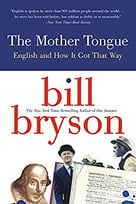 “Language, never forget, is more fashion than science, and matters of usage, spelling and pronunciation tend to wander around like hemlines.”
“Language, never forget, is more fashion than science, and matters of usage, spelling and pronunciation tend to wander around like hemlines.”
― Bill Bryson, The Mother Tongue: English and How It Got That Way
What do you think? Do writers and editors need to continually practice grammar rules and language traditions as they are used by others? Or do you think that they should dictate the grammar rules and traditions that others use? Or do you perhaps think they should do a little bit of both?
Language is not static and is always changing; this much is certain. Remember when “LOL” wasn’t in the dictionary? Punctuation usage and grammar rules have also changed over time, especially in this era of social media, electronic communications, grammar-checking software, and artificial intelligence.
Perhaps editors and writers should abide by grammar rules and dictate those rules as if they were lexicographers. Lexicographers add words to the dictionary when those words have widespread, sustained, and meaningful use. Or is this what writers and editors already do? Do writers and editors already add or adjust grammar rules in style guides and similar resources when those rules change over time and exhibit widespread, sustained, and meaningful use?
So, what should writers and editors do to practice grammar rules that change over time? How about the following?
Everyday Work
Writers and editors constantly adapt to grammar rules and usage because they see changes in grammar almost every day. And they often need to use different style guides and grammar conventions, depending on what they’re working on.
It’s also likely editors will review writing that has a new type of “error” in it and will have to decide whether the error should be addressed and how to address it. For instance, it’s not uncommon for editors to leave a preposition at the end of a sentence, and to allow split infinitives or sentence fragments in certain contexts. Or were these rules always bent in certain contexts?
How, if, and why these rules changed may be a mystery to stricter grammarians, but it happened. Some grammar rules became outdated in some industries and in some writing fields, resulting in new grammar rules that editors and writers adapt to and follow.
Explore New Types of Work
Many writers and editors work within defined specialties, such as academia, technology, healthcare, or business, and don’t work outside of them very often.
But to understand grammar rules and usage more broadly, all writers and editors should get outside of their comfort zones every once in a while. This way they can experience grammar and language usage in other broader contexts. For example, an academic studying psychology might want to also review pop culture pieces or review more scientific neurological work to see how other writers use phrases and terms.
Review New Versions of Style Guides
Writers and editors also follow style guides and must stay up to date when newer editions are published. Some popular style guides, like the AP Stylebook, are updated every year. And many style guides that are hosted online are updated more frequently throughout the year.
Network with Other Writers and Editors
Writers and editors will and should debate various grammar rules and usages with one another. They should meet often to explore how various grammar rules and customs are applied and why. When writers and editors network with one another, they can build consensus on what rules should be updated and why, and within what contexts. If they want to change or update a grammar rule, they must first understand the rule and why it’s there in the first place.
Read Anything and Everything
In addition to reading pieces they’re working on, writers and editors should constantly explore and read a variety of writing types if they want to understand and practice grammar rules and usage holistically. One can’t exclusively read newspaper articles or blog posts or novels or poetry or business studies, etc. and believe they understand grammar holistically…can they? What do you think?
***
What do you think writers and editors should do to practice their grammar skills and expertise? Share with us in the comments below.




